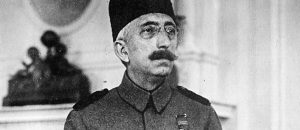Rahime Perestu Sultan, the last Valide Sultan of the Ottoman Empire, is a figure who went down in history not for political intrigues, but for her compassion and distance from politics, representing the most graceful and silent farewell of a centuries-old tradition. The title she bore as the spiritual mother of Sultan Abdülhamid II no longer signified a power governing the state, like Kösem Sultan, but rather a completely symbolic and dignified position, similar to the “Queen Mother” in Western palaces. With her death, the institution of “Valide Sultanate” officially faded into history, and an era quietly closed in her person. [Link: The Dynasty and its women in Dolmabahçe -> /learn/the-dynasty-and-its-people].
“Valide” But Not the Birth Mother: The Institution of Spiritual Motherhood.
Rahime Perestu Sultan’s Valide Sultanate showed a significant difference from the traditional line of succession. She was not Sultan Abdülhamid II’s birth mother, but his spiritual mother who adopted and raised him at a young age. Perestu Kadınefendi, one of Sultan Abdülmecid’s consorts, had no children of her own. When Sultan Abdülhamid’s mother, Tirimüjgan Kadınefendi, died young, Sultan Abdülmecid entrusted his son Abdülhamid to Perestu Kadınefendi, who was known as compassionate and kind-hearted. Perestu cared for the prince like his birth mother and was closely involved in his education and upbringing. For this reason, even though his birth mother was not alive when Sultan Abdülhamid II ascended the throne, he granted Perestu Kadınefendi, who acted as his mother, the highest rank, the title of “Valide Sultan”. This title was based on loyalty and respect rather than blood relation.
A Portrait Distant from Politics: The Role of the “Queen Mother”.
Rahime Perestu Valide Sultan presented a profile exactly opposite to the ambitious and political struggle of Pertevniyal Sultan, who preceded her in her role in the Harem. She meticulously avoided interfering in state affairs and took no part in any political intrigue or power struggle. Her world was limited to the administration of the Harem in Yıldız Palace, the education of the palace women and concubines, the application of protocol rules, and charitable works. She was known in the palace as a highly respected, fair, and compassionate administrator. Her role was entirely that of a modern “Queen Mother”: she held the highest dignity as the Sultan’s mother but possessed no political power. This situation is the clearest indicator of how the institution of the Valide Sultanate evolved and was completely purified of politics. [Link: Pertevniyal Sultan’s ambitious and political struggle -> /bir-annenin-iktidar-savasi-pertevniyal-sultanin-reformlarla-imtihani].
Her Relationship with Sultan Abdülhamid II: Deep Respect.
Sultan Abdülhamid II showed his spiritual mother, Rahime Perestu Sultan, deep affection and unwavering respect throughout his life. Although he never allowed his mother to interfere in state affairs, he always valued her opinions and maternal feelings. Perestu Sultan was one of the rare people in Sultan Abdülhamid II’s complex and often lonely world whom he trusted, could take refuge with, and found maternal compassion in. This deep respect the Sultan held for her ensured that everyone in the palace showed the Valide Sultan the same reverence. Their relationship was also part of an effort to redefine the Harem not as a hotbed of intrigue, but as a place of family and peace for the Sultan. [Link: Sultan Abdülhamid II’s complex and often lonely world -> /marangoz-hunkar-sultan-ii-abdulhamidin-saraydaki-atolyesi-ve-polisiye-roman-tutkusu]. [Link: The changing roles of Ottoman dynasty women in the 19th century -> https://www.cambridge.org/core/books/empresses-of-the-world/women-in-the-ottoman-empire/A841E343E7E9E57A88D94CD2834C6809].
The End of a Title and Symbolic Legacy.
Rahime Perestu Valide Sultan died in 1904 at Yıldız Palace. Her death meant not only the loss of a family member but also the official end of a centuries-old institution. She was the last person to hold the title “Valide Sultan” in Ottoman history. Since the mothers of Sultan Mehmed V Reşad and Mehmed VI Vahideddin, who ascended the throne after her, were not alive when their sons became Sultans, there was no new Valide Sultan. Thus, the era of the Valide Sultanate, which began with Hürrem Sultans, peaked with Kösem Sultans, and had its last political struggles with Pertevniyal Sultans, ended in the person of Rahime Perestu Sultan with a deserved tranquility and grace.
Conclusion
In conclusion, Rahime Perestu Valide Sultan, as the last Valide Sultan of the Ottoman Empire, is a historical figure who symbolizes the closing of an era in the purest way. Her personality, stripped of political ambition and highlighted by maternal compassion and philanthropy, completed the transformation of the Valide Sultanate institution from a partner in power into a symbolic “Queen Motherhood” position. Her story is the finest example of how a powerful title quietly and gracefully faded into history, aligning with the spirit of the time.



















